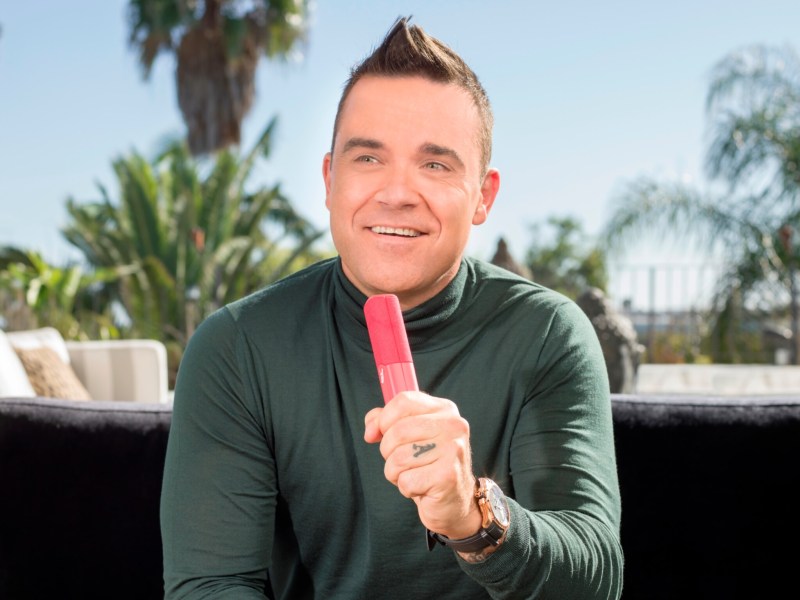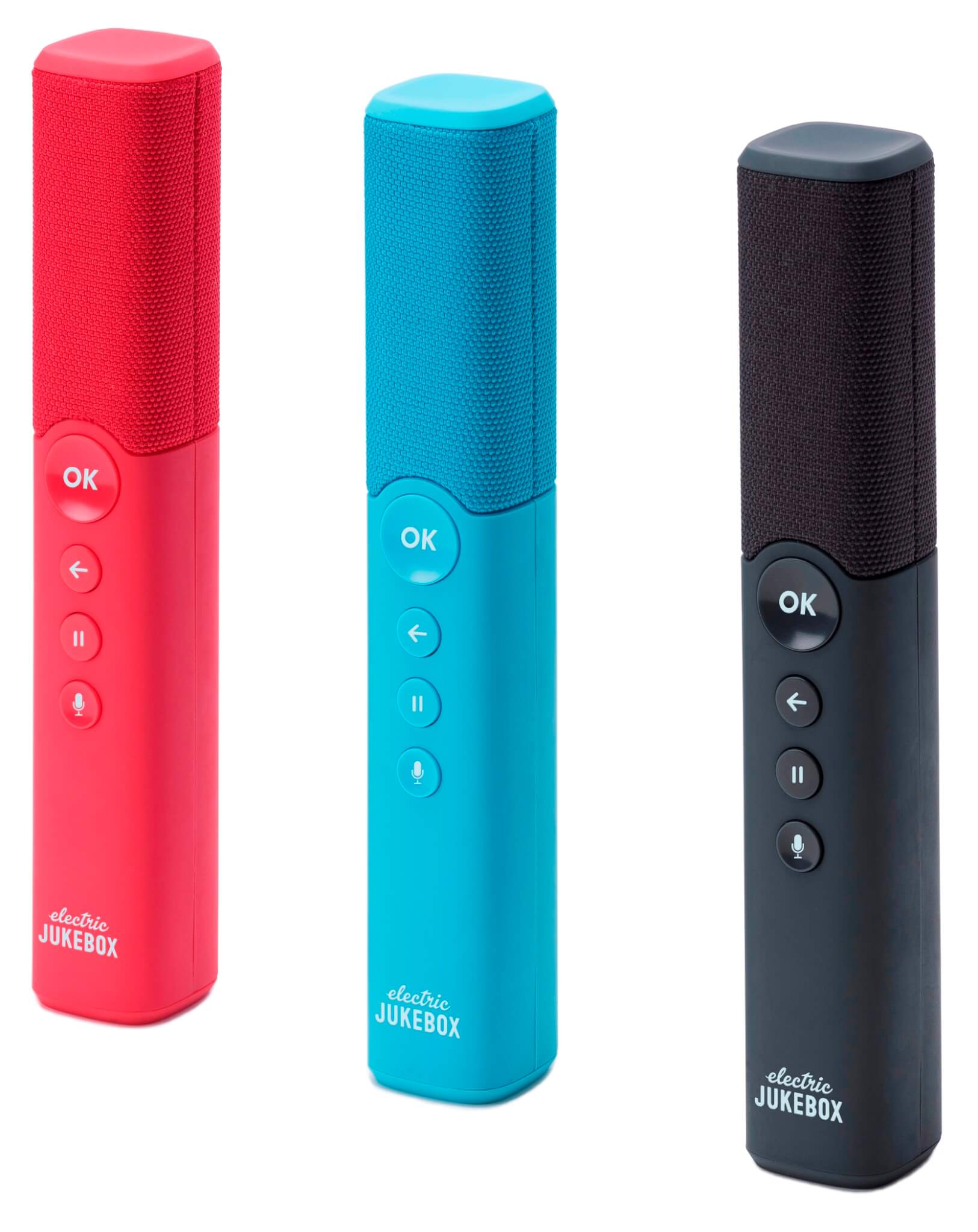More than a year after Electric Jukebox first announced its TV-centric music-streaming service to the world, the device is finally ready for prime time as it goes on sale across the U.K. from tomorrow (November 9).
By way of a quick recap, U.K.-based Electric Jukebox was unveiled at a glitzy launch event in London last October, with big-name backers on board such as Robbie Williams, Sheryl Crow, Stephen Fry, and Alesha Dixon.

Above: Robbie Williams with Electric Jukebox
While the music-streaming market is undoubtedly busy, with Spotify, Apple, Google, and Deezer all fighting for your hard-earned bucks, Electric Jukebox promises a significant differentiator in that it’s a hardware product, and bypasses the need for a smartphone, tablet, or PC altogether.
Available in a triumvirate of colors, the Electric Jukebox can perhaps best be compared to Amazon’s Kindle Fire TV stick, in that you plug a little HDMI dongle into the back of your TV, link it up to your home Wi-Fi, and then control the on-screen interface via a remote control, which also has a built-in mic that lets you search using your voice.
AI Weekly
The must-read newsletter for AI and Big Data industry written by Khari Johnson, Kyle Wiggers, and Seth Colaner.
Included with VentureBeat Insider and VentureBeat VIP memberships.

Above: Electric Jukebox: Remotes
Following the launch event last year, which saw the devices go on sale via preorder, little more was heard about the Electric Jukebox, and its original Christmas (2015) launch plan was shelved, as was the subsequent Easter timescale. So what has the delay been all about?
“We announced the Electric Jukebox Company at BAFTA last year,” explained founder and CEO Rob Lewis to VentureBeat. “Since then we’ve been negotiating radical licensing agreements with record labels and publishers, which we’ve now closed.”
We’re told that deals have been struck with “all pan-European music publishing licensors,” which includes all the major publishers, including Universal Music Publishing Group, Sony/ATV, and Warner/Chappell Music. This means that the product will be good to go across Europe.
Tomorrow, the Electric Jukebox will finally be available to buy, in the U.K. only at first, costing £169, which also offers the first 12 months of service free. After that, users will be expected to pay £52 for a premium pass to access the full ad-free, on-demand catalog of 29 million tunes, or continue on the ad-supported free tier that limits access to a “curated music experience” with celebrity mix-tapes.
The Electric Jukebox will be coming to the U.S. “in the future,” though no firm launch dates or pricing was provided. Based on the previously announced pricing from last year, however, we can assume that the dongle will cost around the $200 mark, give or take, with the yearly subscription weighing in at about $60.
In effect, Electric Jukebox promises roughly the same library of music as Spotify, but for half the price. You can’t ignore the cost of the dongle, though, which if we assume will cost $200 means you will have spent around $380 on Electric Jukebox after four years. With Spotify, you will have spent around $480. Assuming you’re someone who wishes to listen to music on your TV (and to make a fair comparison), you can throw a $35 Chromecast into the mix too, which bumps the Spotify experience up to $515 over the four-year period.
Electric Jukebox also kindly provided some annual price comparisons of its own to illustrate how much better value for the money it is than the competition. Two examples included:
- Apple Music subscription: £119.88 + Apple TV £139 + iPad Air 2 £379 = £637.88
- Spotify subscription: £119.88 + Amazon Echo £149.99 = £269.87
Bundling the Amazon Echo in alongside Spotify in one of the examples was a little odd, given that it’s not really designed to connect to your TV. And equally, the iPad Air 2 felt a little random. The company is assuming that someone will be buying a dedicated piece of expensive hardware to consume their Spotify or Apple Music subscription, when in reality most people already have an Android phone or iPhone.
The company also suggests that the device may be more geared towards older people, those who maybe haven’t subscribed to the smartphone-powered music-streaming hype. It says:
Streaming has failed the older generations who still prefer listening to music on the radio and their existing CD collection than on a smartphone or computer.
Granted, there are some barriers that will preclude many from enjoying music streaming, and in truth I could imagine my elderly parents getting some enjoyment from this. So this could work well in the gifting realm, as younger generations look to shoehorn their parents into the music industry of 2016. The timing of the Electric Jukebox launch, less than 2 months before Christmas, is worth highlighting.
“We’ve removed the barriers to entry which prevent many consumers adopting streaming,” added Lewis. “These include: registering user accounts and passwords, committing to a monthly recurring subscription, downloading apps, performing regular operating system and app updates, complicated list-based user interfaces with hundreds of functions. We give consumers an easy to use physical music player which is plug and play, with no monthly subscription. Setup and use is as easy as using a CD player.”
But this is what confuses me about the The Electric Jukebox. Through its branding and celebrity backers, it feels as though it’s trying to target a younger crowd, the type of crowd who would already stream music through a myriad of connected devices.
At its announcement last year, I was skeptical about whether there really is a demand for a dedicated hardware “solution” that brings music streaming to TVs, and nothing has happened in the intermittent months to alter that viewpoint. I’ve yet to go hands-on with one of the devices, but assuming the device has been executed with aplomb, I’m still not sure there is a big enough demand for this.
To revisit another point I made during the launch event last year, any product that goes to market with the backing of celebrities just doesn’t bode well. Glitzy, noisy launches are great at drumming up interest, but the proof will ultimately lie in the pudding.
So what is the celebrities’ involvement with Electric Jukebox, exactly — are they paid endorsers? No; as it turns out, they’re all fully signed-up shareholders.
“None of the celebrities have been paid for their involvement in Electric Jukebox,” said Lewis. “The celebrities have got involved because they share our desire to make music streaming simple so that we can open up music streaming to a wider audience than today. Sheryl Crow, Robbie Williams, Stephen Fry and Alesha Dixon all curate mixtapes for the service, and are Electric Jukebox shareholders.”
Electric Jukebox has raised a total of £7 million ($8.7 million) since its inception.
VentureBeat's mission is to be a digital town square for technical decision-makers to gain knowledge about transformative enterprise technology and transact. Learn More
